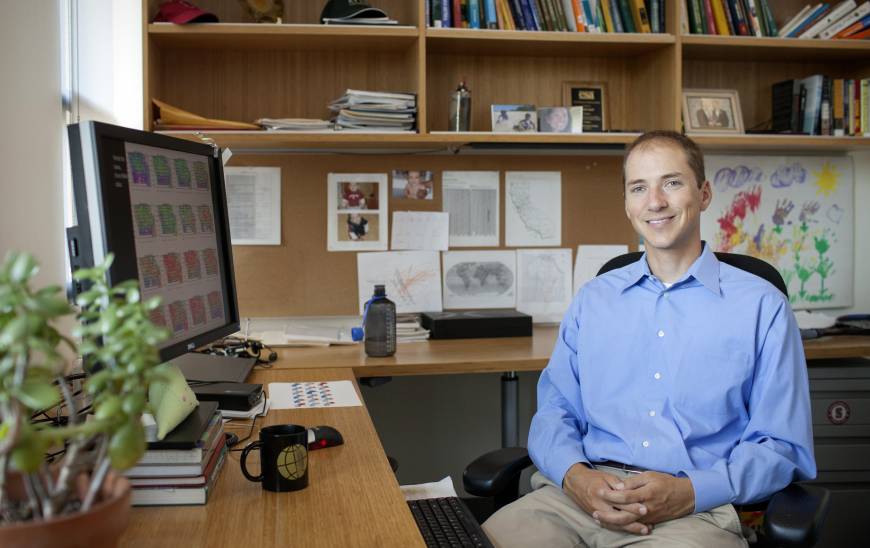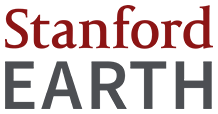The Stanford School of Earth, Energy & Environmental Sciences is now part of the Stanford Doerr School of Sustainability.
This page is currently being maintained for archival purposes only. For the latest information, please visit us here.
Tackling food security in a growing, changing world
David Lobell of the Stanford School of Earth Sciences was recently named a 2013 MacArthur Fellow for his use of a multidisciplinary approach to tackle problems related to global food security in the face of modern challenges such as climate change and a growing human population.
October 14, 2013

David Lobell
Lobell, an associate professor of environmental Earth system science, received his doctorate degree from Stanford in 2005 and was appointed to the faculty in 2009.
According to the MacArthur Foundation, fellowships are awarded to talented individuals in a variety of fields in recognition of originality, creativity, self-direction and capacity to contribute importantly to society through their work. The fellows receive a $625,000 "no-strings-attached" grant over five years to use in any way they see fit.
Lobell recently sat down with School of Earth Sciences writer Ker Than to talk about the award and his research.
How did you find out the news about the MacArthur Fellowship?
I received a call in early September. I didn't recognize the number, and didn't answer the first few times because I was busy prepping for my classes. But I finally answered, and the caller said she was from the MacArthur Foundation and asked whether I had time to talk confidentially. At first, I assumed she was calling to ask for a reference, because I have a lot of great colleagues.
But right away, she said she was calling to congratulate me, and that I'd been selected as a MacArthur Fellow. I was not 100 percent sure it was the same award that I'd heard about, so I started Googling it while she was on the phone. She was emphatic that I could only tell one person the news and that I then had to swear them to secrecy.
Whom did you tell?
My wife, of course. She congratulated me, and said it was probably a good thing we're going on sabbatical because it'll give us some time to digest all of this.
She had heard of the award as well but didn't really know what it was. We both assumed at that point that it was like a normal research grant, and that it was money given to the university to use for research. But later, the MacArthur Foundation sent me a letter making it clear the money was for me and I could use it how I wanted.
Have you thought about how you plan to spend the money?
I've thought about it, but I don't have any immediate plans. I'm trying to think of ways to use the money to help me identify good ideas and become a better scientist. What has worked well for me in the past is starting with a good question, and that's always come through a process of traveling and getting to know a community of people working on a certain problem. I haven't been able to do that as much lately, especially with small kids, so this opens up opportunities to travel with the family and work with more people.
The MacArthur Fellowship awards creativity in a chosen field. What role has creativity played in your own work?
I think creativity in science is often about making connections between problems in one area and approaches or data in very different areas. So it’s often about being self-directed - you don't really know or care that you're not supposed to be going to lectures in some totally different field or that you're not supposed to talk to people who are non-academics all the time. But I think doing those things has really benefited me. Partly that comes from being mentored all along by people who encouraged that.
For example, in 2008 I traveled to Kenya, and it could have just been a trip during which I presented my results. But I was really interested to meet different people, and I ended up meeting the person who headed a drought trial program. The scientists ran trials to figure out which particular maize plants will do well and to pick ones to distribute to farmers to improve their yields.
At the time, we were looking for more data to better understand how crops in Africa respond to climate change. So we took their dataset, which had not even been fully digitized yet, and linked that to weather data. When we did our analysis, we saw that it was the hot days that were really damaging the crops.
That match wouldn't have happened if I was not listening and talking to people outside of my discipline, and vice-versa.
What's the most unexpected comment, question, compliment or invitation you've received related to winning the MacArthur?
I've gotten some really nice emails from the public – from people I’ve never met. I received one from a 4th grade teacher in Wyoming who's trying to teach her kids about the importance of creativity and innovation. She wanted to know if the 4th graders could send me a couple of questions, so I'm waiting on that.
One striking aspect of your research is that it draws upon many different fields, such as agriculture, economics, climate change, and so on. Did you purposefully set out to gather skills in various areas?
I think it goes back to being self-directed. I've always asked what are the questions that I think will hold my interest for a long time? And what do I need to learn about to be able to answer them? I haven’t worried much about what disciplinary label I get assigned, or whether I will publish in some particular journal.
One key thing about being self-directed is not pretending to know things you don't know. It's about being a student and to continue that learning process even if you're established in a particular area of expertise.
Another key is being in an environment that values and encourages multi-disciplinary approaches. There is a lot of lip service but I don’t think many places do, and the federal funding system generally doesn’t. But Stanford, for the most part, truly does.
You've said that growing up outside of New York City, the biggest field you saw growing up was when you went to Shea Stadium for a Mets game. How did you get into agriculture?
Initially, what really brought me in was the understanding that there will be so much demand for food going forward that if we don't get much better at agriculture, there's going to be a huge loss of native habitats and possibly increases in hunger. Just from an intellectual standpoint, that's what drew me in.
What are some of the big questions that drive your research?
One is how do we adapt to climate change in a way that allows us to maintain or improve global food security. For a long time, the thought was that agriculture is always adjusting to the weather and it'll happen automatically. I think scientists now understand that we have to do more than just wait for people to catch up. We have to be more proactive.
I also want to understand more generally how we should invest in agriculture. We have to become more productive if we don't want to use millions of hectares of land. As good as we are now, we have to be better.
But we have limited resources, and we have to place bets. And just thinking about what are the right bets to place is a really interesting problem. How beneficial would it be to invest in irrigation? Or new ways of delivering fertilizer? Or maybe the real key is to shift agricultural production to different regions.
What are some of the greatest threats to global food security?
Like a lot of major problems, the biggest threat may be complacency. There have been periods of history in which we’ve had a really good run of agricultural production. We felt like we had mastered this, and that we didn't need to invest much more resources. So you've seen investment really decline, and there's now a general lack of infrastructure and human capital in many places.
We've also never really had to deal with climate change in the past. Weather has been pretty stable throughout the history of agriculture. We've always had to deal with bad years here and there, but not a serious global trend in climate.
There are also plenty of threats not related to agriculture. For example, how to employ and enrich the poorest billion in the world so that they can afford enough food is a huge challenge. And the challenges of providing energy now spill over into food because of rising demand for crops to create bioenergy such as biofuels.
The good news is we have lots of opportunities now that didn't exist before. All of the data that my group now uses to try to tackle these problems weren't available 20 years ago.
So just like we have some novel challenges ahead, we also have a lot of novel tools to address them.



